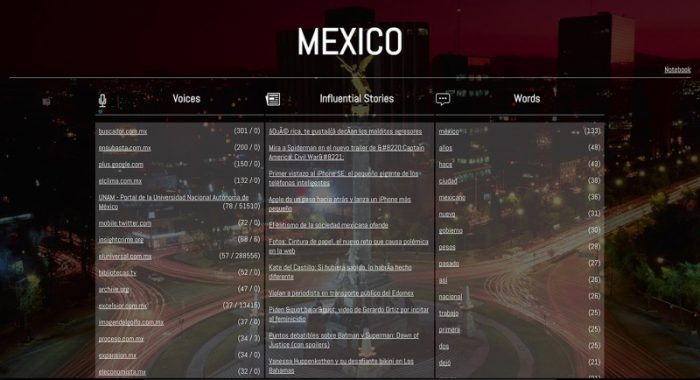
It’s hard to prove or disprove allegations of media bias, or to notice any change in how global issues are covered, globally. Calls of too little or too much coverage are frequently anecdotal, and the takes from indignant journalists no more data-driven.
These debates over media representation are tough to answer definitively without data. How, for instance, has the language changed (if at all) across media coverage of Ethiopia and its detention of activists? How would non-specialists without advanced technical knowhow seeking to write about these issues around online media even begin to undertake this sort of analysis?Global Voices is teaming up with MediaCloud on a two-year project supported through a Google Digital News Initiative grant — under the working title NewsFrames — to develop editorial workflows and build complementary set of digital tools that will allow writers and researchers both within and outside the Global Voices community to explore over time how often, and how, news topics are covered.
“For a long time, I’ve wanted to try to put more data and quantitative analysis behind some of the claims and questions we ask around underrepresented and misrepresented stories in online spaces,” Ivan Sigal, executive director of Global Voices, told me. “We have the chance to investigate those stories occasionally when we’re lucky enough to work with data scientists in our community to do big data research, but we can’t do it on a regular basis.”
The collaboration with Media Cloud opens up the possibility for more Global Voices contributors to do that kind of work on a regular basis. Media Cloud, a joint project from MIT’s Center for Civic Media and Harvard’s Berkman Center for Internet & Society, is an open source platform that provides a massive data set of news sources and tools centered around analyzing how news gets covered. As regular readers of Nieman Lab may already know, Media Cloud data has been a useful resource for big-picture questions, such as whether stories around Black Lives Matter protests in Ferguson and Baltimore were framed positively or negatively. Media Cloud and Global Voices both have origin stories that involve Ethan Zuckerman, the director of MIT’s Center for Civic Media (and new MIT professor) — though Sigal notes the two “have a lot in common in terms of trying to understand media ecosystems.” Founded by Zuckerman and then Berkman Center fellow Rebecca MacKinnon in 2004, the nonprofit Global Voices is an online platform powered by a largely volunteer community of authors that, among other initiatives, publishes news and opinion from citizen media in many languages. It showcases sources outside mainstream media and emphasizes a non-English-centric approach.With the NewsFrames project, the focus is as much on building a product as it is on figuring out the editorial questions the tool is meant to address, and developing an editorial process that will allow people to use the tool in a way that will generate actual stories, of actual value to readers around the world. The Global Voices team and researchers at Media Cloud are in the process of brainstorming what features the tool that best serves these purposes should have (can multiple people share and track the same topic search? can the tool aggregate data from all topic searches?) and what it should look like (does it have its own space, domain? is it compatible with WordPress? will it still require some training to use?).

Sigal emphasized that as with any project in its infancy, early conversations with potential users could reshape it, and sketched out for me possible use cases for the tool. For instance, a writer looking to cover Ethiopia and anti-terror legislation there might set up a series of queries on specific topics and countries in Media Cloud to see how others are covering the issue, and track that search over time. Is more of the online discussion centered around “terrorists,” or are there stories about activists and human rights?
NewsFrames could allow for meta-analysis. The clamor over whether the November attacks in Paris or the ones in Beirut the evening before received drastically uneven coverage, Sigal said, began early with a Global Voices piece by Lebanese blogger Joey Ayoub. Will the heated conversations around media bias change media coverage if there’s another succession of attacks?
“We have a lot of ideas and notions, and there’s a lot of testing, but we are really interested in trying to create something for building and managing queries and research topics over time, and doing that collaboratively,” Sigal said. “One of the challenges of Media Cloud is that it’s built for specialists and researchers and is not so easy for people who aren’t familiar with the interface to use. The hope is to bring these questions and the research methodology a step closer to other people.”
Initially that group will be Global Voices writers and editors, but Sigal said he could envision a body of research made available to nonprofit and advocacy organizations and other news outlets, and even, down the line opportunities to monetize through providing custom research for groups interested in specific topics.
“Our approach is being very aware of the fact that it’s possible to build tech that doesn’t work, or is only of use to a smaller number of people, or costs a lot of money to maintain, and so forth. So we’re trying to put equal emphasis on the editorial side as on the tech side,” Sigal said. “Our brainstorming sessions have put some pressure on the ideas to see whether they survive first contact with different use cases. Rather than start with the tech and trying to get people to use it, we’re starting with the question of what has value to our editorial team.”
Global Voices is currently looking for a project director to oversee NewsFrames, and will bring on a few more dedicated staffers as the project progresses, while working with existing Global Voices editors and contributors and the Media Cloud team.